You want to feel like you’re on top of the world.
When it comes to your varicose veins health, Milner Vein & Vascular Surgical Center will help you get there!
WE TREAT THE FOLLOWING CONDITIONS
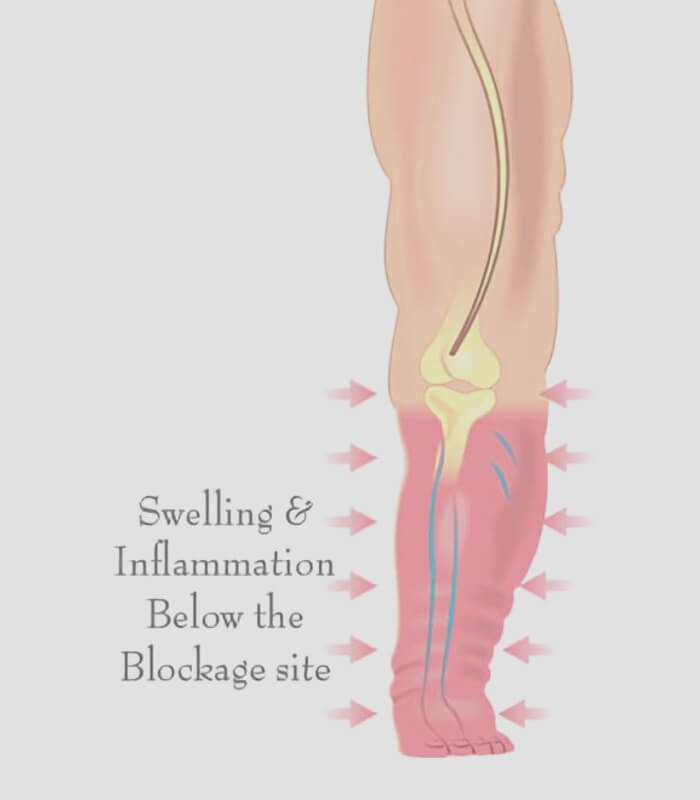
Venous Insufficiency
Swollen legs are a very common symptom seen in patients with venous disease. Malfunctioning valves within the veins allow blood to pool, increasing the pressure within the veins. This creates a condition known as “edema,” in which fluid seeps out into the surrounding soft tissues and accumulates there, resulting in swelling and tightening of the skin. Edema can be very uncomfortable. In addition, other causes of leg swelling include blood clots, heart problems, kidney dysfunction, hormonal imbalances, and liver damage.
In order to treat a patient’s leg swelling, the doctors at Milner Vein & Vascular must first determine the cause. The underlying condition must be treated to relieve any symptoms, and what works for swelling caused by venous insufficiency will not necessarily work for swelling caused by other conditions. A color duplex ultrasound exam will allow the doctor to identify whether the edema is caused by venous disease so that he can determine the most efficacious treatment.
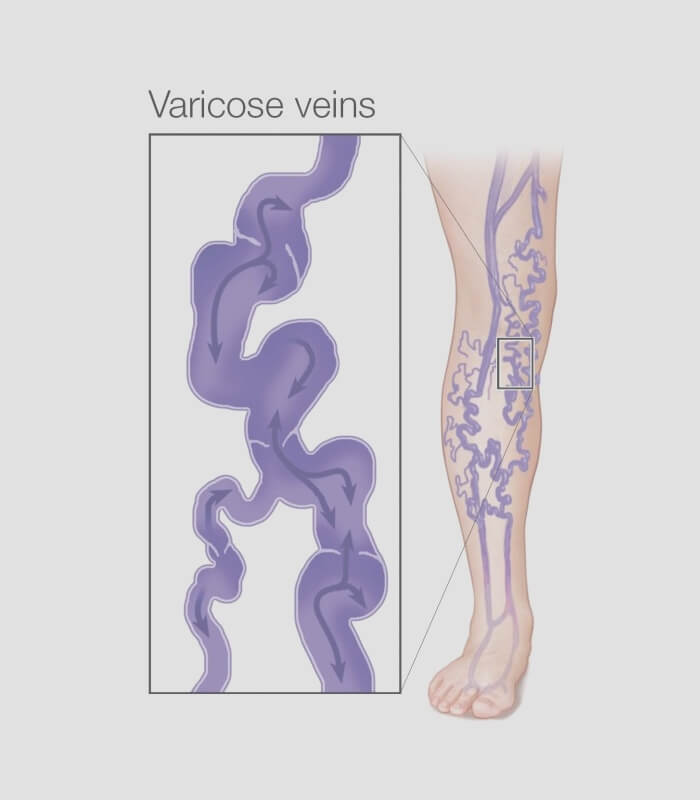
Varicose Veins
Varicose veins are superficial veins that have become abnormally dilated due to improper blood flow. When working properly, veins have valves that prevent blood from flowing backward. When these valves fail, blood pools and pressure builds with the veins, causing the veins to dilate and become more visible, as well as uncomfortable. Varicose veins can cause aching, itching, and throbbing, as well as burning and cramping.
Thanks to cutting-edge advancements in varicose vein care, Milner Vein & Vascular surgical center in Lithonia can achieve excellent results in eliminating varicose veins with minimally-invasive procedures. Your doctor will perform an ultrasound to identify problem veins and determine the best course of treatment.
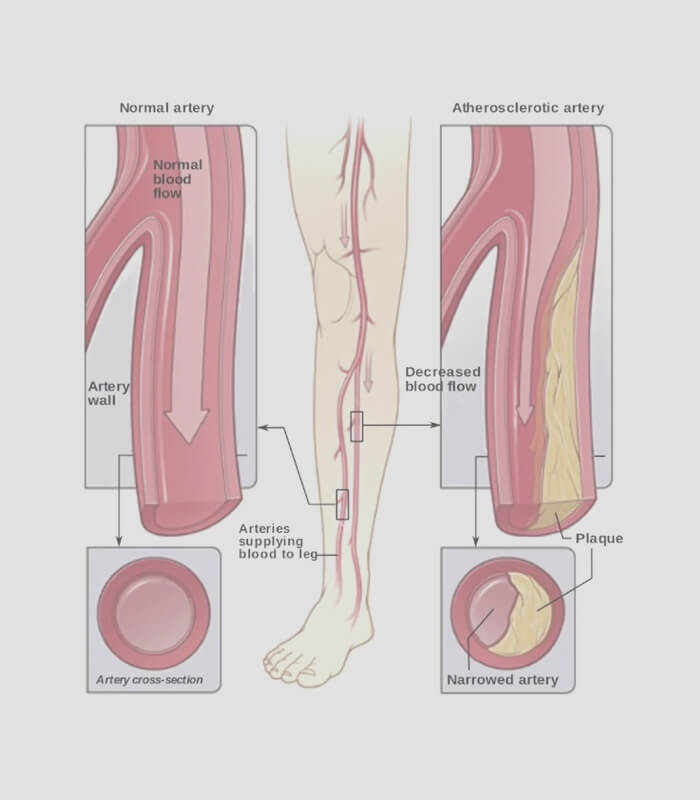
Leg Cramps/Peripheral Artery
Depending on the stage of venous disease, patients may experience a significant level of leg pain or discomfort. This pain happens for several different reasons. First, there are pain fibers in the walls of veins that sense when a vein is stretched. As the blood pools in the legs, pressure is generated and the veins become stretched causing pain. Secondly, as blood pools in the legs pressure pushes blood plasma into the soft tissues causing swelling of the lower legs. This puts undue pressure on the skin that causes pain and cramping.
Other symptoms of chronic venous disease include a feeling of heaviness in the legs, cramps, swelling, skin tightness and/or thickening, itching, and the formation of ulcers around the ankles. Sensations of pain may increase when the patient has been standing and may improve when the legs are elevated. For long-term relief, Milner Vein & Vascular will need to will need to treat the underlying cause of peripheral artery disease and not just the symptoms.
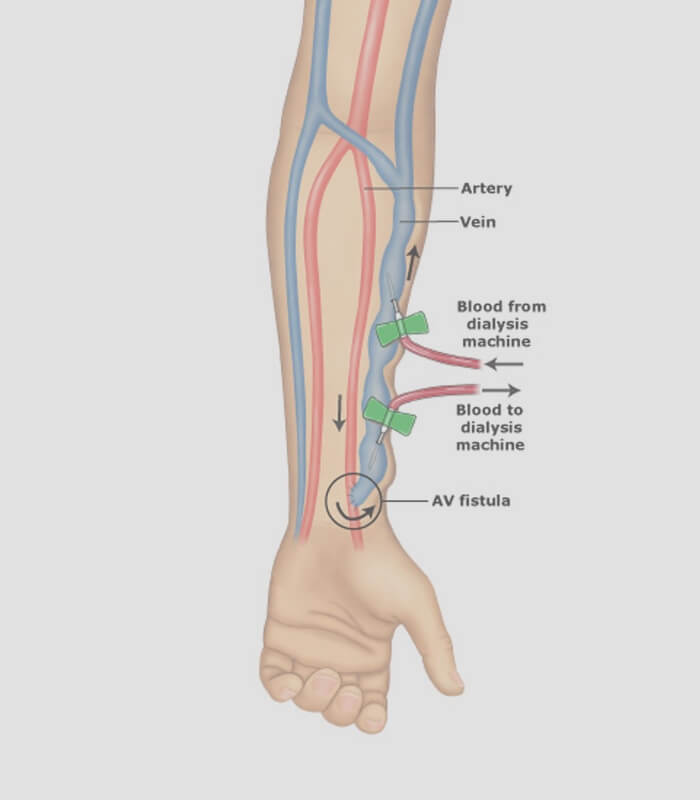
Dialysis Access Management
Our Vein Clinics in Hillendale and Lithonia GA have advanced medical equipment and services to properly manage dialysis access.
When your kidneys are healthy, they clean your blood. But when they fail, you need treatment to replace the work your kidneys used to do. Unless you have a kidney transplant, you will need dialysis.
Hemodialysis is most successful if your access is functioning well. But what happens when you have an issue with your fistula, graft or catheter? The most common access problems are an infection and low blood flow due to narrowing or blood clotting in the arteriovenous (AV) access. In addition, a condition called “Narrowing”, also known as stenosis, can lead to clot formation, which will reduce the overall effectiveness of your dialysis treatments, and eventually, blood flow through the access may stop.
Our outpatient facility provides the crucial care and maintenance needed to preserve or restore function to AV vascular accesses for dialysis patients.
Signs and symptoms you may need to seek medical advise:
• Diabetes
• High blood pressure (hypertension)
• Kidney inflammation (glomerulonephritis)
• Blood vessel inflammation (vasculitis)
• Kidney cysts
CALL (678) 580-1149 TO SCHEDULE YOUR VARICOSE VEINS EXAM NOW!
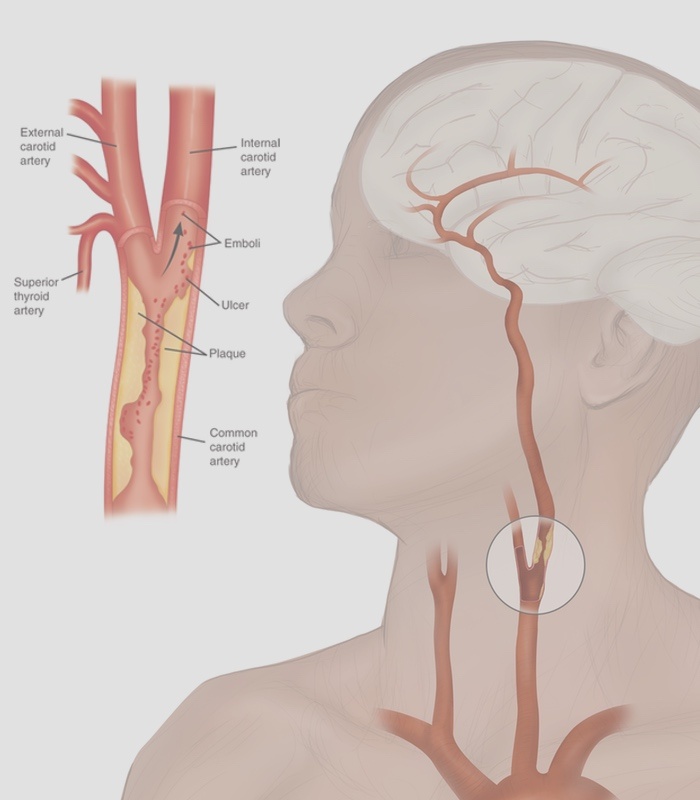
Carotid Duplex Artery Disease
What does the carotid artery have to do with veins? Well, it’s responsible for supplying blood to both your brain and face and is the large artery found directly under your jaw on both sides of your neck. It’s usually the pulsating artery in your neck. Believe it or not, one can develop the disease in this artery! This Carotid Artery Disease is caused by the buildup of these things: fat, cholesterol, and plaque material and can also cause atherosclerosis within the vessel.
Risk Factors
There are several risk factors that can lead to the development of carotid artery disease including high cholesterol, high blood pressure, obesity, diabetes, excessive smoking and a family history of blood clots. As a result, over a period of time this disease can reduce the vital and necessary blood flow to your brain and face, which can cause a lack of blood supply also known to cause a stroke.
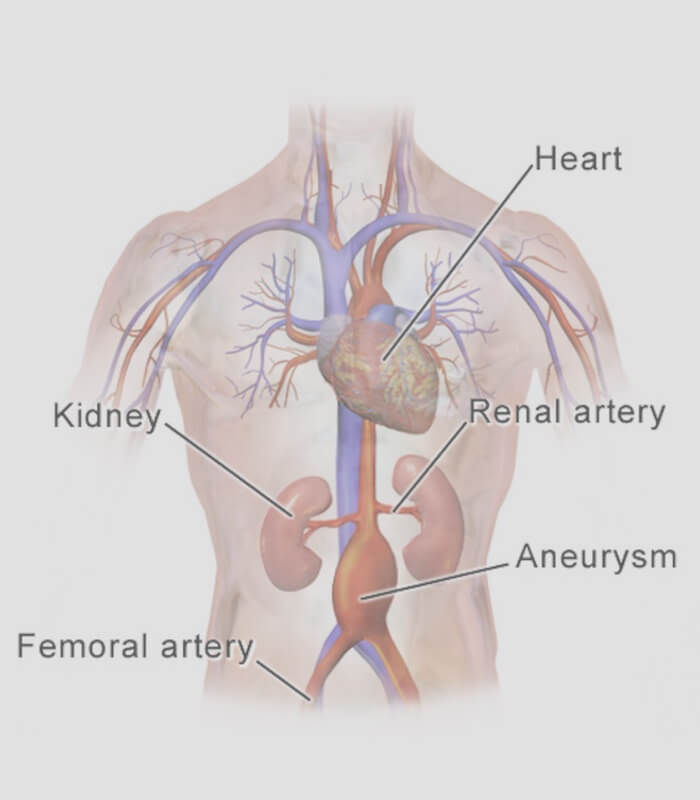
Aortic Aneurysm
An abdominal aortic aneurysm is an enlarged area in the lower part of the major vessel that supplies blood to the body (aorta). The aorta runs from your heart through the center of your chest and abdomen.
The aorta is the largest blood vessel in the body, so a ruptured abdominal aortic aneurysm can cause life-threatening bleeding.
Depending on the size of the aneurysm and how fast it’s growing, treatment varies from watchful waiting to emergency surgery. Furthermore aneurysms can develop anywhere along the aorta, but most aortic aneurysms occur in the part of your aorta that’s in your abdomen.
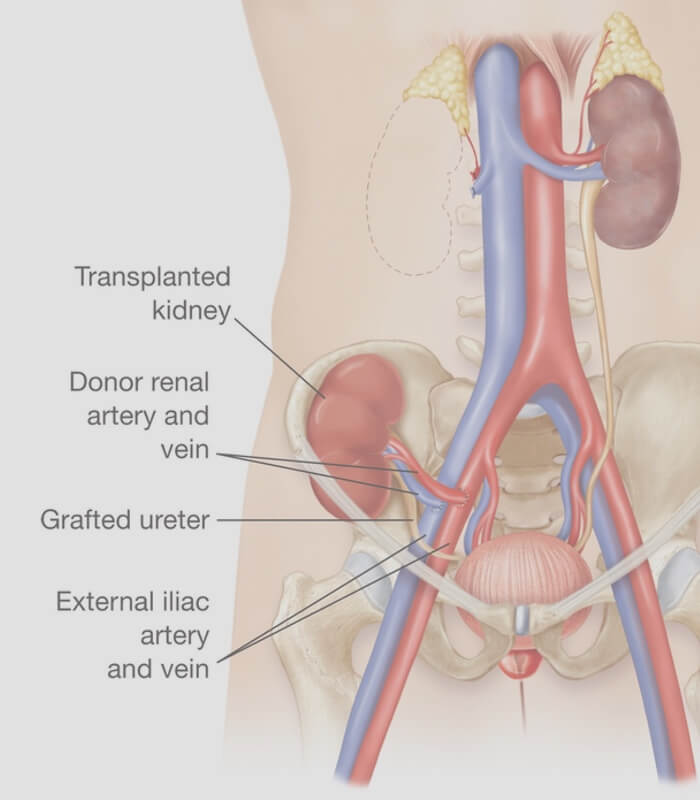
Renal Artery Stenosis
Renal artery stenosis is the narrowing of one or more arteries that carry blood to your kidneys (renal arteries).
Narrowing of the arteries prevents normal amounts of oxygen-rich blood from reaching your kidneys. Your kidneys need adequate blood flow to help filter waste products and remove excess fluids. Reduced blood flow may increase blood pressure in your whole body (systemic blood pressure or hypertension) and injure kidney tissue.
Renal artery stenosis may cause no signs or symptoms until the condition reaches an advanced state. Most people with renal artery stenosis have no signs and symptoms. The condition is sometimes discovered incidentally during testing for some other reason. Your doctor may also suspect a problem if you have high blood pressure that begins suddenly or worsens without explanation.
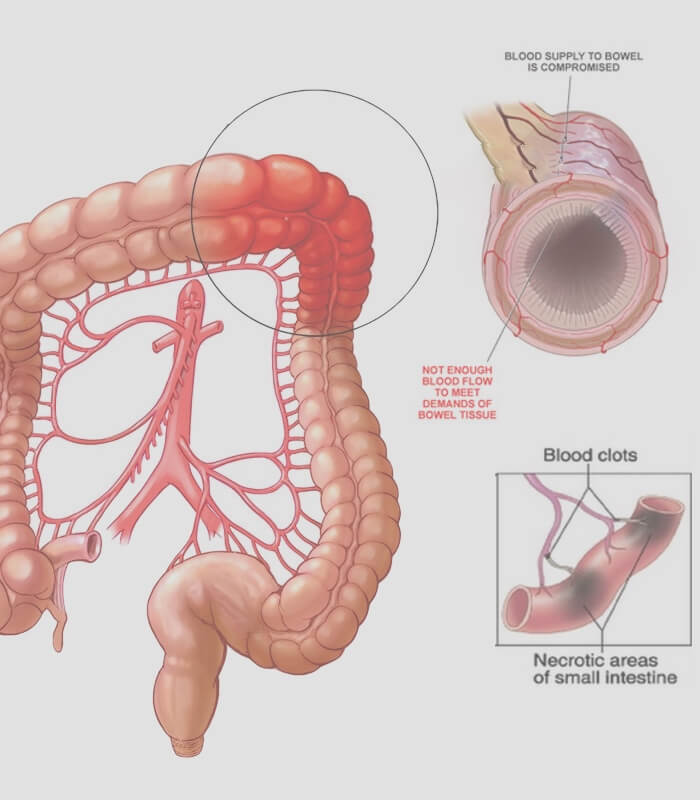
Mesenteric Artery Stenosis
Mesenteric artery stenosis occurs when narrowed or blocked arteries restrict blood flow to your small intestine. Decreased blood flow can permanently damage the small intestine.
Sudden loss of blood flow to the small intestine from a blood clot requires immediate surgery. Mesenteric artery stenosis that develops over time (chronic) is treated with angioplasty or open surgery.
If left untreated, chronic mesenteric artery stenosis can become acute or lead to severe weight loss and malnutrition.
Symptoms of mesenteric disease include abrupt, severe abdominal pain, an urgent need to have a bowel movement, fever, nausea and vomiting.
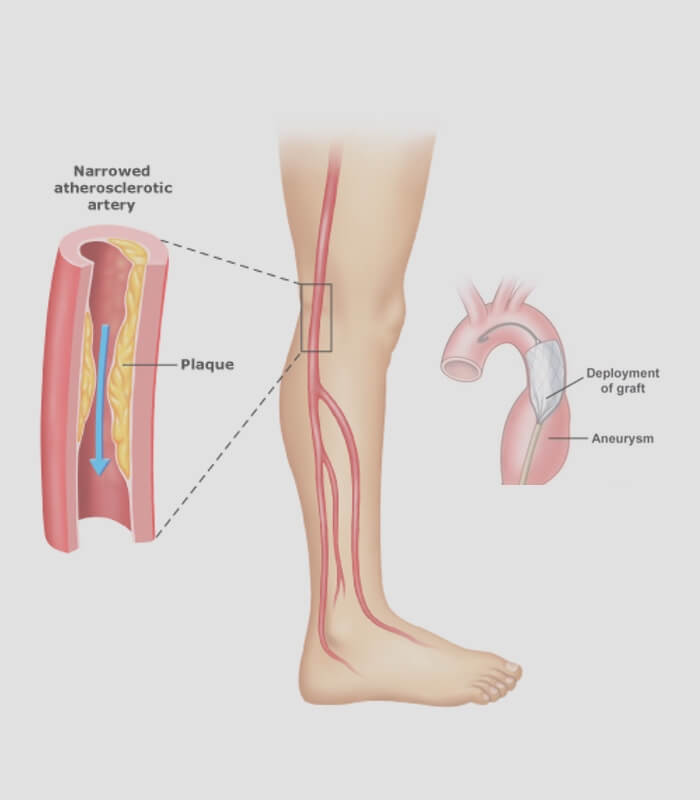
Peripheral Aneurysms
A peripheral aneurysm is an enlargement or weakened area in an artery other than your aorta. It mostly affects the arteries in your legs or neck.
Surgeons at Milner Vein & Vascular are experts in treating peripheral aneurysms. We use minimally invasive techniques and open surgical repair, depending on the extent of your condition.
While the risk of a rupture (when the aneurysm bursts) is low with peripheral aneurysms, they can lead to blood clots. Blood clots block blood flow or shower downstream.
If a clot blocks blood flow for an extended time, this can lead to tissue or organ loss.
Peripheral aneurysms may also put pressure on surrounding nerves or veins. This can cause pain, numbness, or swelling.

DVT (Deep Vein Thrombosis)
DVT occurs when a blood clot forms in one or more of the deep veins in your body, usually in your legs. Deep vein thrombosis can cause leg pain or swelling, but can also occur with no symptoms.
Warning signs of Pulmonary embolism include:
- Sudden shortness of breath
- Chest pain or discomfort that worsens when you take a deep breath or when you cough.
- Feeling light-headed or dizzy or fainting
- Rapid pulse
- Coughing up blood
Risk factors for DVT:
- Inheriting a blood clotting disorder
- Prolonged bed rest, long hospital stay or paralysis
- Injury or surgery
- Pregnancy
- Birth control pills
- Obese
- Smoking
- Cancer
- Sitting for long periods of time
“I had an excellent experience with Dr. Milner and his staff. They were careful with everything before starting my procedure and were very efficient. I’ve already recommended him to a family member.”
C. Abernathy
Patient

Let Us Help Increase Your Circulation
SCHEDULE YOUR APPOINTMENT FOR VEIN & VASCULAR SURGERY IN SNELLVILLE, LITHONIA OR CONYERS GA
Hillandale Office
5700 Hillandale Dr. #120
Lithonia, GA 30058
Snellville Office
2366 Lenora Church Rd.
Snellville, GA 30078
Conyers Office
1775 Parker Rd. SE
Building C, #240
Conyers, GA 30094
Tucker Office
4500 Hugh Howell Rd.
Building 310
Tucker, GA 30084
Office Hours
Sunday Closed
Monday 9:00 AM - 5:00 PM
Tuesday 9:00 AM - 5:00 PM
Wednesday 9:00 AM - 5:00 PM
Thursday 9:00 AM - 5:00 PM
Friday 9:00 AM - 4:00 PM
Saturday Closed